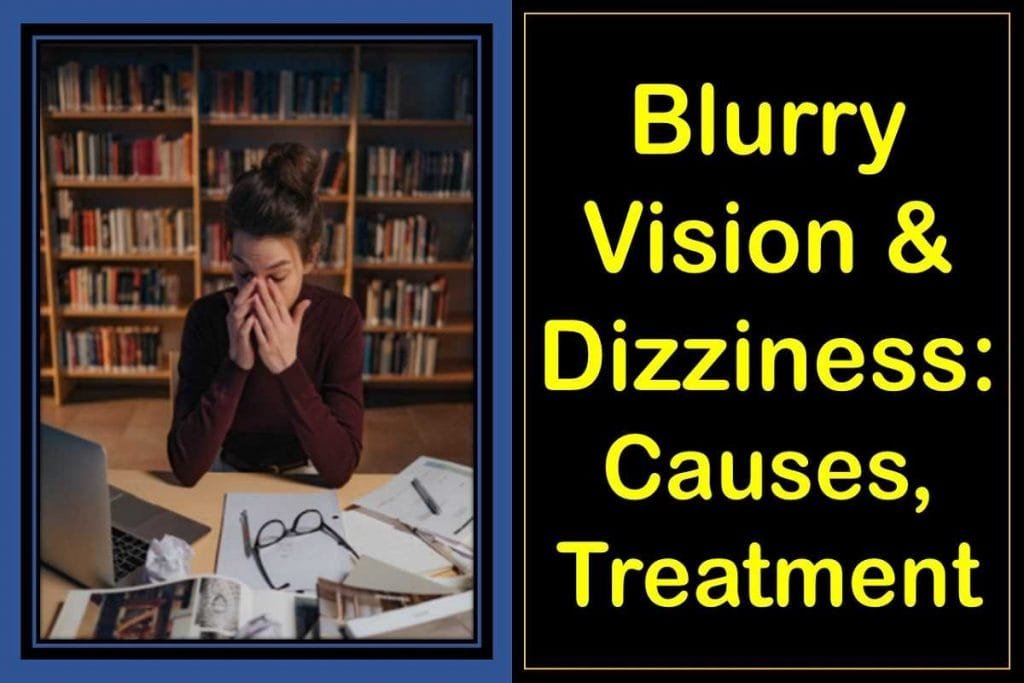Blurry vision and dizziness can be caused by a number of different conditions like stress and medications. It’s key to pinpoint what may have caused these effects in the first place – whether you’re suffering from mild or severe symptoms.
Dizziness is an unsteady feeling that can cause you to lose your balance. It may feel as if you are spinning or moving when you are standing still or sitting. Dizziness and blurry vision are common symptoms that often appear together.
If you get prolonged blurred vision and dizziness, it can be accompanied by other symptoms such as nausea, headache, and light-headedness. When this happens, we encourage you to seek medical advice immediately.

Common Causes of Blurry Vision and Dizziness
There are various possible reasons for dizziness and blurry vision. It could be an indication of something serious, such as one of the following conditions:
Anxiety and stress
When untreated anxiety or stress becomes overwhelming, you may end up with an anxiety attack or panic attack. When either is in progress, adrenaline can cause physical symptoms like dizziness, blurred vision, tunnel vision, and more.
Managing stress and anxiety is the best way to manage the symptoms that stress and anxiety may cause. It’s important to spend time on activities that have a relaxing effect or for managing symptoms in more severe cases, it might be worth consulting a doctor.
Medication
Some medications come with side effects, including dizzy spells, general dizziness, and blurred vision. These reactions are different for everyone. Drinking alcohol can also cause your symptoms to get worse if you’re on medication.
You should tell your doctor if you experience any side effects, whether they’re caused by medication or not. He might not prescribe the same medication (or a combination thereof) and suggest an alternative treatment for you.
Alcohol
Drinking too much alcohol can negatively impact your body, and can have negative side effects such as blurry vision and dizziness. Remember to eat food and drink lots of water when you’re drinking. Make sure you take care of your body and mind, both while drinking and between drinks.
Low Blood Sugar
Depending on the circumstance, low blood sugar (hypoglycemia) can be brought on by diabetes and other conditions. Symptoms of this condition include dizziness and blurry vision, fatigue, and hunger; it could also lead to a light-headed feeling.
If your low-blood sugar symptoms seem to be getting worse, please contact your doctor. Eating a snack or drinking juice may help relieve the mild symptoms.
Concussion or brain injury
Traumatic brain injury is a major cause of blurry vision and dizziness. Injuries to the brain can come from a variety of incidents, including sporting accidents, car accidents, falls, and more. These incidents typically cause a mild concussion or traumatic brain injury (TBI) and the severity of symptoms will depend on how severe the TBI is.
If you experience any type of vision problems after a head injury, go to the ER or an urgent care center right away to be checked.
Migraine Headache
Migraines are not well understood but can include symptoms like nausea, light/sound sensitivity, and dizziness with blurry vision. They may last anywhere from 4-72 hours.
Some ways to manage your migraines include taking a pain reliever, resting in a dark room with little or no outside stimulation, applying cool/warm compresses, and massaging your temples. If you’re experiencing the same issues multiple times per month or if they’re not responding to treatment that’s usually prescribed, then you should talk with your neurologist.
Vertigo and Motion Sickness
Vertigo is the sensation of being dizzy, light-headed, or that your head is spinning. It often happens even when one is sitting down or standing up. This sensation may also come with blurry vision. There might be some causes for the vertigo-like dehydration, migraine, headaches, etc
Motion sickness can be a serious concern in a variety of circumstances, such as sitting in a car for too long or standing next to rapidly moving water. It is most commonly felt like nausea, dizziness, and other uncomfortable feelings like discomfort and headache.
Stroke
A stroke happens when the blood supply to your brain is cut off, which can cause many different symptoms. They can include trouble speaking, sudden onset headache, and face or limb numbness, along with blurred vision and dizziness.
Vision Conditions that might cause blurry vision and dizziness
One possible factor in dizziness and blurred vision is a condition called visual dysfunctions. These could originate from an existing condition such as:
Vertical imbalance: It is a large misalignment in the way objects are seen with each eye.
Anisometropia or antimetropia: It is a significant difference in vision prescriptions between each eye.
Binocular Vision Dysfunction
Binocular visual dysfunction is another common ocular cause of blurry vision and dizziness. It is a condition where the eyes can’t work together and deliver a good image to the brain. Due to the inability of two eyes to work together, different image formations occur in the brain that leads to blurry vision and dizziness.
Adjusting to a New Glasses also leads to blurry vision and dizziness
Adjusting to a new glasses prescription can also cause some mild symptoms like dizziness and blurred vision, but this should go away within a week or two of wear. If you’re experiencing severe symptoms like vomiting, nausea, severe dizziness, it’s important to let an eye doctor know as soon as possible.
When to see a doctor if you have blurry vision and dizziness?
If you notice blurry vision and dizziness associated with the above-mentioned health conditions, consult your doctor to pinpoint the exact cause and to start treatment and preventive measures.
Blurred vision and dizziness associated with eye problems can be treated with eyeglasses or other therapies. Other systemic causes of blurry vision and dizziness might need medicines and surgical interventions. So, it’s a wise decision to see your doctor for effective management of blurred eyes and dizziness.
Takeaway
It’s important to note that blurry vision and dizziness can be signs of more serious conditions like stroke or brain tumor. If you have sudden onset of these symptoms, it is important to seek medical attention immediately.
Sources:
- https://www.webmd.com/stroke/guide/understanding-stroke-symptoms
- https://www.healthline.com/health/vertigo
- https://www.healthline.com/health/anxiety/anxiety-blurred-vision
YOU MAY ALSO LIKE
Sudden Blurry Vision In One Eye: Causes And Treatment
Headaches with Blurred Vision – How to Get Rid of Them?
Waking up with Blurry Vision In The Morning? 6 Causes & Solution
Wavy Squiggly Lines in Vision (Eye Floaters): Causes, Treatment




